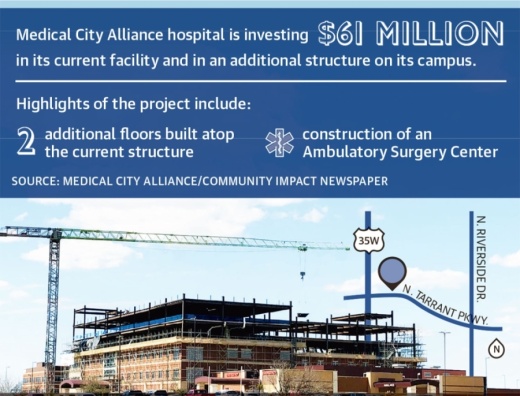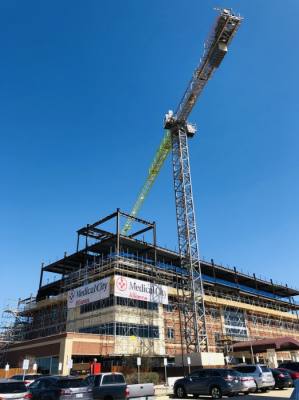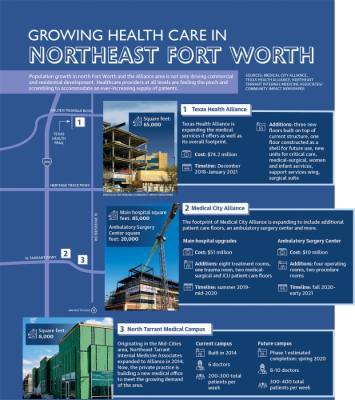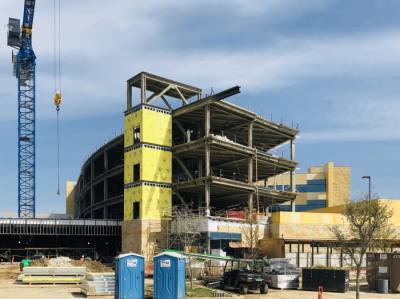As Alliance has grown, Medical City, Texas Health, private practitioners and other providers have made an effort to stay at the forefront of health care growth.
The Alliance region has grown to host more than 240 companies and 7,300 single-family homes.
Within a 5-mile radius of Medical City, the Alliance population increased from 200,000 people in 2010 to an estimated 230,000 people in 2017. That same area is projected to be home to an additional 25,000 residents by 2022, creating an even greater need for health care infrastructure.
Medical City Alliance, which was built by Medical City Healthcare, began in 2012 as a freestanding emergency room; it had expanded to a $100 million, 76-acre campus by 2015.
The latest development projects at Medical City will add two additional floors to the main hospital building. They will also double the size of the hospital’s emergency room and triple the amount of operating room space, according to Matt Eiserloh, Medical City Alliance director of community and public relations.
“The ER set all sorts of records as far as volume. It really gave us a feel for the health care need in this area and how underserved it was,” Eiserloh said. “The hospital was built in 13 months—the fastest MHC has ever built a hospital—because the need was so great.”
As part of the latest Medical City development project, an Ambulatory Surgery Center will open in early 2021 to help create more space in the hospital’s main operating room, Eiserloh said. The center is expected to open in conjunction with a cardiac catheterization laboratory expansion, which will house exam rooms with imaging equipment for heart-related conditions.
The hospital expansion is being bolstered by a nearby MedStar deployment center that will open in spring 2020, Eiserloh said. To start, the $15 million center will house 15 ambulances so that MedStar personnel can better service the North Fort Worth area.
“It’s all about time when it comes to stopping a heart attack,” Eiserloh said. “[The time from] when they hit these doors to the point we get blood restored to the heart is what we’re measured on.”
A developing corridor
Two exits north of MCA on the I-35W-Alliance corridor is Texas Health, which is undergoing a massive expansion project as well. The project passed the halfway point in February and is expected to be completed in early 2021.
The expansion of Texas Health began in 2018 and includes the addition of a number of support and surgical services to the facility.
“Projects like this allow us to continue to grow to meet the needs of the people we serve,” Texas Health Alliance President Clint Abernathy said. “People will come here to get better, to get well and to be a part of a family of those around you at Texas Health who are doing their life’s best work.”
In addition, more than 65,000 square feet of space will be added, featuring new units for medical and surgical procedures, infant services and critical care.
One design aspect of the project, which includes the construction of two additional floors, is a shell that will be constructed as a third floor in anticipation of future use.
Witnessing growth
The growth of the Alliance region is something Dr. Marc Chapman has witnessed firsthand.
Now a partner in a private practice managed by North Tarrant Internal Medicine Associates, he began practicing internal medicine in the Mid-Cities area in the 1990s.
Chapman came to the Alliance area in 2014. He is now in the process of constructing a new Alliance medical office, which will open in spring 2020.
“In 2014, we might see a few patients a day,” Chapman said. “Now, we’re building our own building right across the street [from the current one]. We felt like our practice in the Mid-Cities was stagnant, and watching what’s happened in the last five years [in Alliance]—it’s just amazing.”
What began as a practice with two doctors and two dozen patients per week now requires a larger office to support more than four times those numbers, Chapman said.
The new office will provide more exam rooms as well as additional space for specialists. It will also be located adjacent to Medical City Alliance hospital, he said.
“We’re getting tons of patients that just got here or have been here a year and haven’t found a doctor yet,” Chapman said. “It’s just been great seeing the business and growth out here.”
Coronavirus response
As cities, school districts and chamber organizations cancel events, extend school breaks, and encourage employees to stay home, hospitals are ramping up care in response to the COVID-19 crisis.
“We are following strict guidelines from the Centers for Disease Control and Prevention, which include the appropriate Personal Protective Equipment and isolation of the patient to minimize exposure to other patients and those caring for the patient,” Eiserloh said about Medical City’s response.
There are a number of guidelines for PPE, or specialized equipment to protect against infectious materials, according to the CDC.
Guidelines include the use of gloves to protect hands; aprons and gowns to protect the skin; masks or respirators to protect the nose and mouth; and goggles to protect the eyes.
Medical City officials also indicated that all visitors to hospital facilities will be screened at the entrance. Questions will focus on symptoms, exposure and travel history.
Officials are asking visitors to refrain from coming to the hospital if they are experiencing symptoms, such as fever, cough or shortness of breath.
In addition, both Medical City and Texas Health are offering free coronavirus screenings.
Patients who are experiencing symptoms, who have been in close contact with someone who previously tested positive for COVID-19 or who have visited a high-risk country are encouraged to use Medical City Virtual Care online or call the Texas Health coronavirus hotline at 682-236-7601.








